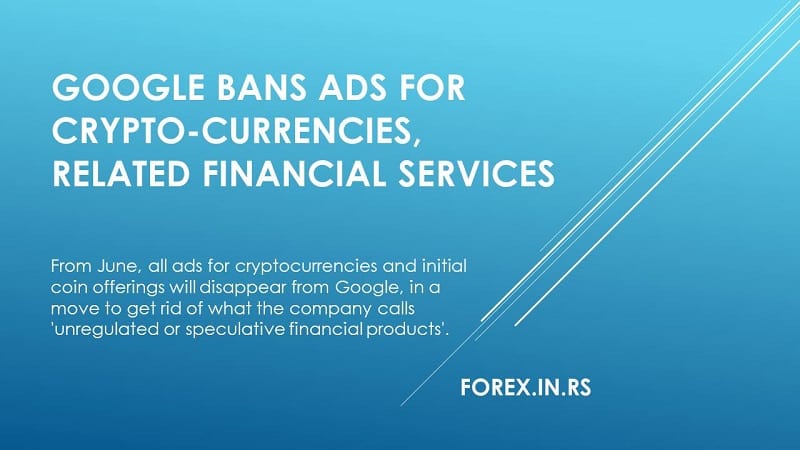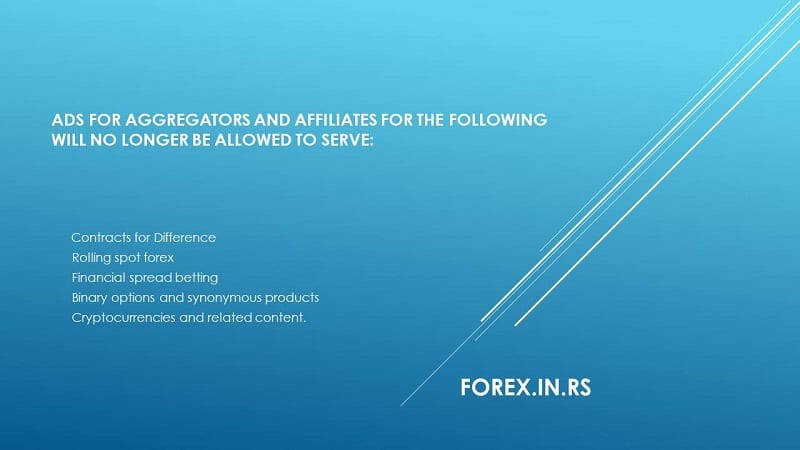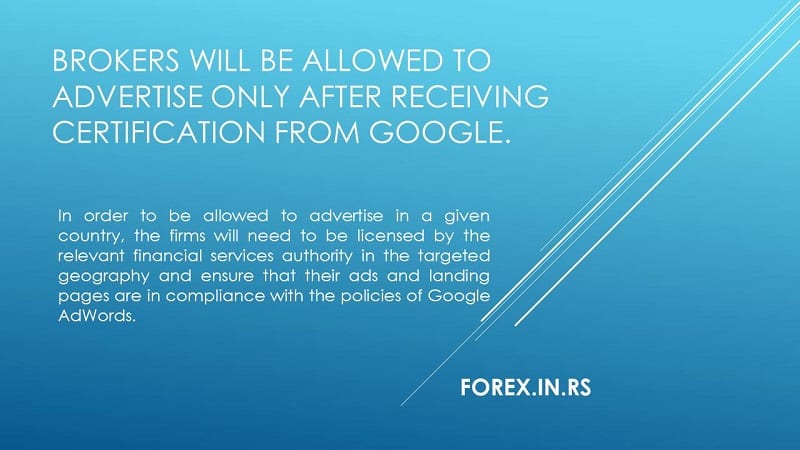Google bans cryptocurrency ads.
Google bans cryptocurrency ad advertisements relating to the initial coin offering (ICO), cryptocurrency wallets, exchanges, and crypto trading advice. Besides that, from Jun 2018. there are ad restrictions for forex and CFD-related ads. Only advertisers with a financial regulation license can create ads related to CFDs.
- Google Ads Policy Update:
- Google updated its financial services policy to restrict the advertisement of Forex trading, CFDs, and related products.
- Reason for Restrictions:
- It aimed to protect consumers from complex, speculative, and high-risk financial products.
- Response to concerns about financial scams and misleading promotions in the Forex and CFD markets.
- Details of Restrictions:
- Bans or strict limitations on ads for Forex trading, CFDs, and certain kinds of financial spread betting.
- Includes restrictions on related financial products deemed overly speculative or risky.
- Certification Requirements for Advertisers:
- Google may allow Forex and CFD-related ads from advertisers who have obtained specific certifications.
- Advertisers must demonstrate compliance with legal and regulatory standards.
- Regional Policy Differences:
- The specifics of the Google Ads policy on Forex and CFDs can vary depending on the region, reflecting differing financial regulations.
- Impact on Financial Services Advertising:
- Forex and CFD service providers are required to adjust their advertising strategies to comply with Google’s policies.
- Necessitates a shift to alternative marketing channels or adherence to strict advertising guidelines.
- Enforcement and Compliance:
- Google uses both automated systems and human review to enforce its advertising policies.
- Advertisers violating these policies face penalties, including ad removal or account suspension.
- Consumer Protection Emphasis:
- The policy is part of Google’s broader effort to safeguard consumers from potentially harmful financial products and deceptive advertising practices.
Google is the world’s leading search Engine Company and the second-largest publicly traded entity globally. With the rising call for more accountability of institutions that deal with the general public to ensure fair, ethical, and open dealings, Google is not left behind in complying with these elements. There has recently been an uproar over the rising number of deceptive adverts running online, with the aim of confusing unsuspecting potential investors. They are ripped off their hard-earned money when they fall into the trap.
Being a world leader in the advertising sector through its AdWord platform, Google has seen it necessary to exercise accountability by enabling only certified financial advertisers. In its announcement, Google banned advertisements relating to the initial coin offering (ICO), cryptocurrency wallets, exchanges, and trading advice. The ban extends to other financial products, such as binary options and spread betting. Forex advertising network will change after the new Google restriction to forex trading ads.

In the past, Google banned search terms for a lot of products. All these have to do with investor protection initiatives due to the rising fraudulent cases involving unauthorized brokers taking advantage of the high wave for quick cash in these unregulated financial products.
With concerns mostly emanating from the U.S. Exchange Commission concerning the ban on ICO advertisements, Google’s move is seen as a precaution to avoid a future clash with the authorities regarding its role in consumer data and protection. On the same note, other significant players in the advertisement world, such as Twitter, Facebook, and Yandex, have taken measures to control the same types of adverts on their sites, either by pre-approval or by the total ban, due to concerns they have raised over legitimacy and also because of maintaining the overall image of these sites.
What Does Google Ban Entail – Google Bans Forex Ads?
Google’s annual earnings in cryptocurrency and related products in financial adverts have been estimated to be over $25 million. Nevertheless, Google has mounted the pressure of axing most of these adverts due to the security of its clients, consumer protection obligation, future accountability, and company image.
This is primarily due to fraudulent cases associated with the unregulated cryptocurrency sector and the looming Security and Exchange Commission rules on protecting cryptocurrency investors. Canada and the U.S. have been at the forefront, leading the war on the ban for adverts on ICO and calling for the establishment of regulations in the online financial sector, especially cryptocurrency, which has hit the world by storm in the recent past. Many investors have lost billions of dollars, mostly from deceiving adverts to which unsuspecting traders fall prey. With. This has come to Google’s attention as a leading player in the advertising world.

Financial Services: New restricted financial products policy (June 2018)
In June 2018, Google will update the Financial services policy to restrict the advertisement of Contracts for Difference, rolling spot forex, and financial spread betting. In addition, ads for the following will no longer be allowed to serve:
Binary options and synonymous products
Cryptocurrencies and related content (including but not limited to initial coin offerings, cryptocurrency exchanges, cryptocurrency wallets, and cryptocurrency trading advice)Ads for aggregators and affiliates for the following will no longer be allowed to serve:
Contracts for Difference
Rolling spot forex
Financial spread betting
Binary options and synonymous products
Cryptocurrencies and related content.Advertisers offering Contracts for Difference, rolling spot forex, and financial spread betting will be required to be certified by Google before they can advertise through AdWords. Certification is only available in certain countries.
To be certified by Google, advertisers will need to:
Be licensed by the relevant financial services authority in the country or countries they are targeting
Ensure their ads and landing pages comply with all AdWords policies
Comply with relevant legal requirements, including those related to complex speculative financial productsAdvertisers can request certification with Google starting April 2018 when the application form is published.
This policy will apply globally to all accounts that advertise these financial products. For more details, see About restricted financial products certification.
(Posted March 2018)

The force on the ban will come into effect this June 2018. In the mentioned financial areas, brokers will undergo thorough scrutiny before getting approval to place the adverts. This will eliminate unscrupulous brokers who sell unregistered securities or pose as genuine brokers to run away with investors’ money. After scrutiny of the broker information, Google will either reject or approve the specific broker. The broker will be issued a special certification to advertise their product in their requested target region when approved.
Nevertheless, for one to qualify for certification by Google, the firms they represent must have acquired the necessary licensing to operate in the regions they intend their adverts to target. On the other hand, they must have conformed to various laws and regulations regarding their business to meet the AdWord requirements for the specific geographical area.
All these processes aim to bring some sanity to the cryptocurrency sector by offering protection to the investors, especially from deceiving adverts being run by fraudulent brokers posing as legit traders. The cryptocurrency craze, especially the one witnessed by Ethereum and Bitcoin, has seen hundreds of other digital coins emerge, with fraudulent traders taking this advantage and floating offers in terms of advertisement for unregistered securities, which has seen either a total market collapse of the specific securities or marginal shift in value for a short period. In this process, billions of dollars have been lost, hence the call for regularization, especially in the adverts concerning this sector, as it is the backbone of the whole process.
An excellent example of a fraudulent case concerns a California-based tech company, Tezos, which conducted an ICO in July 2017 and got a staggering $232 million, which later would emerge that it was a fraudulent deal based on a lawsuit filed at a superior court in San Francisco, alleging violation of U.S. securities law. In such a case, Google and other social media players who are more involved in advertisements of such nature have seen the need to regulate the content. This is amid growing concern about investor protection following huge losses due to reluctance to streamline the advertising sector and digital currencies.
The Effects of the Ban on Google, Brokers, and Investors
Through its platform, Adwords, Google has a billion dollars in advertisement revenues. In the recent past, one of its most lucrative sectors for advertisement has been cryptocurrency-related adverts. It is estimated that Google earned an estimated $25 million annually in advertisement revenues from this sector alone. Nonetheless, Google is more concerned with reputation, consumer protection, and future accountability than revenues.
In 2017, to safeguard investors and consumers in its platforms, Google pulled down an estimated 3.2 billion ads that violated their terms of use. Through its annual report, Google indicated that it was more concerned about user experience than advertisements.
Therefore, the gain will be higher in the long run than the estimated loss in revenue for now, as more consumers gain confidence when dealing with the platform and increase their spending and advertisement due to the site’s legitimacy. This news was one of the most significant news items on Bloomberg, including the Bloomberg video about Google’s financial restriction, Blo, and Bloomberg news about the bitcoin drop. For the brokers, the best time to make a difference is now. All is not lost. This is the time for those who offer genuine adverts to take advantage and get certification, as unscrupulous brokers get scared.
For genuine brokers, this is the time for the right push for their products. As Google positions itself as an open and genuine platform, the brokers can associate with these attributes now and in the future to gain investor confidence.
On the other hand, as market penetration becomes difficult, brokers can explore other options, such as optimizing the Google search ranking, operating genuine websites, and performing offline marketing. On the same note, trading companies can increase their social media presence and increase traditional advertising, such as below-the-line marketing and Radio or T.V. advertisements. This will ensure that even when they face the ban on Google AdWords, their presence is still felt on the other platforms, and they can keep their clientele informed.
On the investor side, the Google ban means more than ‘just a ban.’ This will increase client confidence and user experience, which will suit the company. The users will feel safe and valued, giving them the confidence to transact over the platform.
The ban also assures that the adverts that appear on AdWords are genuine and verified by Google, creating a responsible environment where users can feel secure with whoever they deal with. Investors are always concerned about how secure their payment will be.
Therefore, knowing that the existing brokers are certified and the adverts thus are genuine provides confidence in investment choice. The move will also ensure that fraudulent cases are reduced, and in cases where they appear, Google is aware of how to hold them accountable as it will have already verified the user and know them better.
Without consumers, organizations can barely survive, and thus, there is a need to be more vigilant in protecting them whenever possible. The move by Google can be termed a broad movement for the interest of its users and to avert future troubles of being held accountable for the damages or losses that may emanate from a non-regulated advert sector. This move has also seen other big players extend the same measures, and sooner or later, many investors hope that they will operate in a world where deceiving adverts will be a thing of the past and brokers will be responsible. This reality is not far from considering the measures to attain a free, fair, and genuine advertisement world.
























